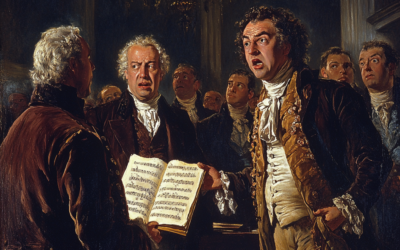The Golden Spur
Mozart’s Hollow Honour
While often portrayed as a prestigious award, the Golden Spur (Speron d’Oro) granted to Mozart in 1770 was far from a reflection of his musical genius. In this article, we delve into the true story behind this now-forgotten honour, its loss of value, and the role of Leopold Mozart’s ambitions in securing it.
Mozart: The Fall of the Gods
This book offers a fresh and critical look at the life of Wolfgang Amadeus Mozart, challenging the myths that have surrounded him for centuries. We strip away the romanticised image of the “natural genius” and delve into the contradictions within Mozart’s extensive biographies. Backed by nearly 2,000 meticulously sourced citations, this work invites readers to explore a deeper, more complex understanding of Mozart. Perfect for those who wish to question the traditional narrative, this biography is a must-read for serious music lovers and historians.
"By the time Mozart received the Golden Spur, it had become so devalued that anyone wearing it was mockingly called ‘Stivalone’—a term implying foolishness."
@MozartrazoM
On 19 May 1770, Leopold Mozart wrote excitedly from Naples to his wife, hinting at a great honour soon to be bestowed upon his son, Wolfgang Amadeus Mozart. Just over a month later, on 26 June, in Rome, that honour arrived in the form of the Golden Spur (Speron d’Oro), conferred upon Wolfgang by Cardinal Andrea Negroni, acting on behalf of the Vatican.
However, as with many moments in Mozart’s life, this supposed “great honour” was not quite what it seemed. Far from being a reflection of Wolfgang’s musical brilliance or a reward for an extraordinary achievement, such as the fabled transcription of Allegri’s Miserere, the title was nothing more than a hollow token, given through connections and influence rather than true merit.
Leopold’s Role in Securing the Title
Leopold Mozart, ever the ambitious promoter of his children’s talents, had worked behind the scenes to secure this honour for Wolfgang. The award was not personally granted by the Pope, as later myths would claim, but by Cardinal Pallavicini. Leopold likely pulled strings within his network, possibly through the Pallavicini family of Bologna, who had strong ties to Austria. This was a clear demonstration of Leopold’s relentless efforts to elevate his son’s status across Europe, no matter the cost.
But this honour, which Leopold proudly broadcasted to Salzburg, had by then lost its true meaning. Once a prestigious mark of distinction, the Golden Spur had devolved into little more than a symbol of vanity. It was no longer reserved for those who had achieved greatness but had become a purchasable trinket, handed out to those with the right connections, wealth, or influence.
A Farce of an Honour
By the time Mozart received the Golden Spur, it had been widely ridiculed. No longer a meaningful award, the Speron d’Oro was often mocked and dismissed. In fact, anyone wearing the medallion in Italy was given the nickname “Stivalone” or “Grosso Stivale,” meaning “big boot,” a term used to imply foolishness or stupidity. Rather than a badge of honour, it had become a symbol of ridicule.
Even the notorious Casanova, who received the same Golden Spur, wrote in his memoirs about his initial pride in the award, only to later realise it was an object of derision. He recounts an incident in Russia where he was advised to remove the medal to avoid being laughed at.
Mozart, like Casanova, eventually came to the same conclusion. While Leopold pushed his son to wear the cross and sign his compositions as “Knight W. A. Mozart,” Wolfgang soon distanced himself from the title. In letters, he expressed how he was ridiculed for it, recognising the insignificance of the award. Over time, Mozart discarded the title altogether, understanding that it was more of a burden than a true mark of distinction.
A Devalued Honour in Mozart’s Time
The Golden Spur that Mozart received was a far cry from the honour it once represented. Decades earlier, when Christoph Willibald Gluck was granted the same title, it still held value. By the time of Mozart, however, the award had become so devalued that many, like Casanova, believed it was better not to receive it at all.
Leopold, however, did not see it this way. He continued to boast about the honour as a great achievement for his son, further demonstrating his fixation on status and appearances. For Wolfgang, however, the reality of the Speron d’Oro soon became clear—it was an empty gesture, a reflection of his father’s ambition more than his own achievements.
The End of the Golden Spur
By the early 19th century, the Golden Spur’s reputation had sunk so low that Pope Gregory XVI reformed the order in 1841, replacing it with the more dignified Order of St Sylvester. The Golden Spur, once a proud mark of distinction, had become a relic of a bygone era—its prestige long gone.
Mozart’s story with the Speron d’Oro serves as a reminder that honours and titles, especially those obtained through influence and pressure, do not always carry the weight they seem to. What Leopold saw as a great fortune for his son was, in reality, nothing more than a hollow trinket, symbolic of a system more interested in connections than true achievement.
Conclusion:
The awarding of the Golden Spur to Wolfgang Amadeus Mozart is often remembered as a prestigious moment in his early career. But the truth reveals a different story—one of influence, ambition, and an honour that had lost its true meaning. Mozart, much like Casanova, eventually recognised the title’s insignificance, discarding it as nothing more than a remnant of his father’s relentless pursuit of recognition.
To learn more about this forgotten episode in Mozart’s life and other untold stories, watch our latest YouTube video, #4 The Golden Spur: Mozart’s Faded Honour.
You May Also Like
When the Myth Collapsed
Vienna exposed the myth: La Finta semplice was riddled with errors, and Wolfgang’s supposed opera genius was nothing more than Leopold’s fabrication. With their reputation in ruins, father and son turned to Italy, hoping to rewrite history.
The London Notebook and the Vienna Disaster
Far from the myth of a flawless young genius, Mozart’s London Notebook reveals musical struggles and guided exercises, while the Vienna opera disaster proved that his father played a far greater role in his compositions than legend would have us believe.
Versailles, Vanity, and the Pursuit of Prestige
Leopold Mozart’s letters transformed his son’s European tour into a carefully staged fantasy—filled with exaggerated encounters, fabricated royal admiration, and a relentless pursuit of social prestige. But how much of it was real?
The Fabricated Childhood of Mozart
The legend of young Mozart’s divine genius crumbles under scrutiny, revealing a childhood dictated by Leopold’s ambition, carefully constructed myths, and a relentless pursuit of fame at the expense of genuine artistic education.
The Man Behind the Myth
Leopold Mozart’s legacy has been shaped by myths and hagiographies, but his letters reveal a man more concerned with financial gain and self-promotion than artistic integrity. Was he truly a devoted father, or simply an opportunist?
Constanze vs. The Catholic Church
For over two centuries, scholars have debated the circumstances surrounding Mozart’s burial. Constanze Mozart’s supposed inability to mark his grave, the confrontation with the Catholic Church over funeral masses, and the baffling disappearance of Mozart’s body all contribute to a mystery stranger than fiction. Did a powerful group keep her silent? And what really happened to Mozart’s remains?







